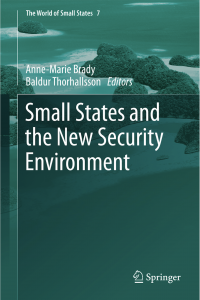Our new book, Small States and the New Security Environment, is just out - published in the Springer book series the World of Small States.
 This book examines the security, defence and foreign policy choices and challenges of small states in NATO and its small partner states in the new security environment. The main aim of the book is to analyse how these states are dealing with current and emerging security challenges and how they might better prepare for these challenges. A special focus is on ‘new’ security threats and solutions, such as drones and hybrid warfare. Simultaneously, the book focusses on how small states are responding to emerging ‘old threats’, such as Russian aggression in its neighbouring states and increased activity in the North Atlantic.
This book examines the security, defence and foreign policy choices and challenges of small states in NATO and its small partner states in the new security environment. The main aim of the book is to analyse how these states are dealing with current and emerging security challenges and how they might better prepare for these challenges. A special focus is on ‘new’ security threats and solutions, such as drones and hybrid warfare. Simultaneously, the book focusses on how small states are responding to emerging ‘old threats’, such as Russian aggression in its neighbouring states and increased activity in the North Atlantic.
The book presents the theory of shelter (which is derived from the diverse and extensive literature on small states) and uses it to examine how small states respond to new and old security threats. Shelter theory addresses three interrelated issues of common concerns to small states: the reduction of risk before a possible crisis event, assistance in absorbing shocks in times of crises, and help in recovering after such an event. In short, shelter theory claims that small states need external shelter in order to survive and prosper. They are dependent on the economic, political, and societal shelter provided by larger states, as well as regional and international organizations.
